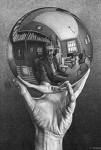|
CHAPTER VIII.
OF THE GOOD FORTUNE WHICH THE VALIANT DON QUIXOTE HAD
IN THE TERRIBLE AND UNDREAMT-OF ADVENTURE OF THE WINDMILLS,
WITH OTHER OCCURRENCES WORTHY TO BE FITLY RECORDED
At this point they came in sight of thirty to forty windmills that there are
on plain, and as soon as Don Quixote saw them he said to his squire,
"Fortune is arranging matters for us better than we could have shaped our
desires ourselves, for look there, friend Sancho Panza, where thirty or
more monstrous giants present themselves, all of whom I mean to engage in
battle and slay, and with whose spoils we shall begin to make our
fortunes; for this is righteous warfare, and it is God's good service to
sweep so evil a breed from off the face of the earth."
"What giants?" said Sancho Panza.
"Those thou seest there," answered his master, "with the long arms, and
some have them nearly two leagues long."
"Look, your worship," said Sancho; "what we see there are not giants but
windmills, and what seem to be their arms are the sails that turned by
the wind make the millstone go."
"It is easy to see," replied Don Quixote, "that thou art not used to this
business of adventures; those are giants; and if thou art afraid, away
with thee out of this and betake thyself to prayer while I engage them in
fierce and unequal combat."
So saying, he gave the spur to his steed Rocinante, heedless of the cries
his squire Sancho sent after him, warning him that most certainly they
were windmills and not giants he was going to attack. He, however, was so
positive they were giants that he neither heard the cries of Sancho, nor
perceived, near as he was, what they were, but made at them shouting,
"Fly not, cowards and vile beings, for a single knight attacks you."
A slight breeze at this moment sprang up, and the great sails began to
move, seeing which Don Quixote exclaimed, "Though ye flourish more arms
than the giant Briareus, ye have to reckon with me."
So saying, and commending himself with all his heart to his lady
Dulcinea, imploring her to support him in such a peril, with lance in
rest and covered by his buckler, he charged at Rocinante's fullest gallop
and fell upon the first mill that stood in front of him; but as he drove
his lance-point into the sail the wind whirled it round with such force
that it shivered the lance to pieces, sweeping with it horse and rider,
who went rolling over on the plain, in a sorry condition. Sancho hastened
to his assistance as fast as his ass could go, and when he came up found
him unable to move, with such a shock had Rocinante fallen with him.
"God bless me!" said Sancho, "did I not tell your worship to mind what
you were about, for they were only windmills? and no one could have made
any mistake about it but one who had something of the same kind in his head."
"Hush, friend Sancho," replied Don Quixote, "the fortunes of war more
than any other are liable to frequent fluctuations; and moreover I think,
and it is the truth, that that same sage Friston who carried off my study
and books, has turned these giants into mills in order to rob me of the
glory of vanquishing them, such is the enmity he bears me; but in the end
his wicked arts will avail but little against my good sword."
DON QUIXOTE, by Miguel de Cervantes [Saavedra], Translated by John Ormsby
Go Back to Discussion
| |


